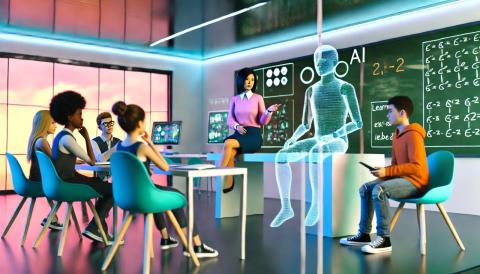
Teachers, AI, and the Future of Learning
I recently attended an ART meeting. With AI tools becoming increasingly prominent, teachers agree that their role in delivering content is becoming limited. This shift presents an opportunity for teachers to rethink their roles in the classroom and explore alternative approaches. Interestingly, this issue was raised during the meeting, and we discussed it in depth.
But first, what is an ART meeting? In Delhi Government schools, each school has a Teacher Development Coordinator, supported by the Academic Resources Team (ART). The ART typically consists of one member from each subject group. At least once a month, these members convene to discuss academic issues and share innovative classroom practices.
Returning to the question raised during the meeting: Will teachers continue to be needed for content delivery? I, too, highlighted that the traditional role of teachers as content deliverers is gradually fading. AI tools now have the capacity to speak on almost any topic, and their voices no longer sound robotic. With advancements like voice cloning, a teacher can even have an AI tool speak in their own voice.
What's Left in the Classroom Now?
I believe that teachers and students can now collaborate to explore a deeper question: How does a child learn? This question is deeply individualistic. Any attempt to generalize an answer for all learners inevitably falls short. The learning journeys of individuals differ significantly, which is why no learning theory has ever fully explained how humans learn. These theories provide frameworks with some general applicability but cannot account for every unique case.
Now is the time for teachers to help each child discover their unique way of learning. The key lies in careful reflection and documentation of learning experiences across various domains. For example, how one learns to ride a bicycle might differ significantly from how they learn subtraction. Similarly, learning to make chapatis might differ completely from understanding the connection between historical events and their present-day implications.
With a teacher's guidance, children can embark on this journey of self-discovery, exploring their own methods of learning. Once this discovery is made, the learning journey becomes unstoppable. The timeframe for such a process will vary from child to child, but the outcomes are transformative.
Similarly, teachers must continue to reflect on and document their teaching experiences. Teaching is an art, and it raises profound questions: How does one know they are teaching effectively? What constitutes good teaching? Can teaching itself be taught? Fundamentally, we must ask: What is teaching?
A Time for Exploration
I believe this is the perfect time for teachers to engage with these questions, which have always deserved investigation. AI's growing presence in education can be liberating, allowing teachers to focus on fostering curiosity and deeper learning.
Ultimately, the questions: What is learning? and What is teaching? are open-ended. There is no single answer to these questions. If we definitely knew how people learn, there would be a product in the market—a "magic pill" for learning. Similarly, if teaching could be fully standardized, it, too, would become a packaged product. However, the nuances around these questions fuel human curiosity, and for thousands of years, we have been trying to answer them.
Now is the time for both students and teachers to engage in this shared exploration. It is this curiosity that makes education a profound and evolving journey.
- Log in to post comments
